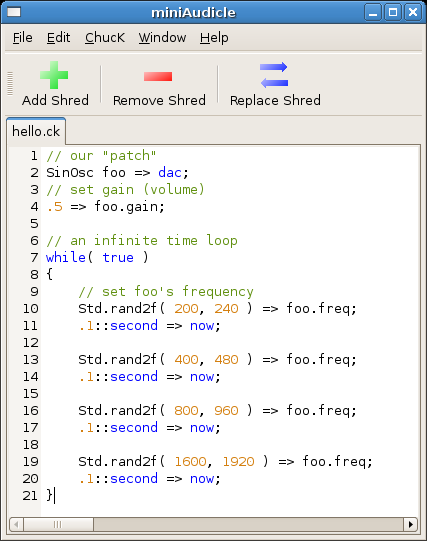Launch miniAudicle and change the setting in Preferences. Basically you want to set the audio input/output to Grame: Jack Router and the sample rate to 48000. Start the virtual machine and add a simple shred (eg. Check if you can see the input and output ports on the connection manager in Jack. You should see the ports with red. In this aim, ChucK shell presents users with a native shell-like interface for interaction with the ChucK virtual machine. MiniAudicle is a graphical user interface for developing, running, and modifying ChucK programs, providing a framework for extending the expressive capabilities of ChucK in possibly unforeseen ways, and making ChucK more.
Chuck Miniaudicle

FaucK is a Chugin allowing to combine the powerful, succinct Functional AUdio STream (Faust) language with the strongly-timed ChucK audio programming language. FaucK allows programmers to on-the-fly evaluate Faust code directly from ChucK code and control Faust signal processors using ChucK's sample-precise timing and concurrency mechanisms. The goal is to create an amalgam that plays to the strengths of each language, giving rise to new possibilities for rapid prototyping, interaction design and controller mapping, pedagogy, and new ways of working with both Faust and ChucK.
FaucK should work both in the terminal and MiniAudicle.
Warning: FaucK is still being developed and things are moving quickly. Use it a your own risks!

Known Issues/Bugs (better start with that ;) )
- Currently, FaucK objects can only have one audio input and one audio output.
- If MiniAudicle crashes when you start its virtual machine, try to edit its preferences, restart the software and start the virtual machine again. This sounds very hacky, but this bug has been reported by some beta testers and we were not able to reproduce it on our own computer. This workaround seems to work though :).
- Beside that, there are probably dozens of bugs that we don't know yet: it's your job to tell us about them :).
Installing FaucK
OSX
In order for FaucK to work, you should have the latest release of ChucK installed on your system.
The easiest way to install FaucK on OSX is to get this package and follow the instructions in the README.
Alternatively, building FaucK from scratch might not be a bad idea... If you want to do that, please refer to the following section.
Linux
In order for FaucK to work, you should have the latest release of ChucK installed on your system.
You'll have to build FaucK from scratch following the instructions bellow.

Windows
In order for FaucK to work, you should have the latest release of ChucK installed on your system.
The easiest way to install FaucK on Windows is to get this package and follow the instructions in the README (special thanks to David Braun for making this possible!).
Building FaucK (Unix Systems Only)
OSX and Linux
FaucK uses the 'on-the-fly' LLVM based version of the Faust compiler (http://faust.grame.fr) also known as libfaust. Thus, in order to compile FaucK, Faust should be installed on your system. If you don't have it, get it from the Faust Git Repo (https://github.com/grame-cncm/faust). faust has a couple of dependencies so you might have to fix them before you can do anything. For instance, the LLVM developement files (we recommend version 3.8 or <) as well as openssl will be needed.
Chuck Miniaudicle
Once you compiled and installed faust, you should be able to build FaucK. On Linux, just type:
on OSX:
Hopefully, everything went well and you're now ready to FaucK around!

Windows
FaucK hasn't been tested on Windows so let us know if you make it work!

Using FaucK
FaucK objects can be used easily in any ChucK code through a Chugin called Faust. For example, a new Faust unit generator (e.g., an audio DSP effect that takes an input from ChucK) can be declared as follow:
In the case where foo would be a synthesizer, the adc would be ignored and we could simply write:
Any Faust program can be associated with foo and dynamically evaluated by calling the eval method.
For brevity and convenience, stdfaust.lib is by default automatically imported by FaucK. Furthermore, note the use of the backtick (`) to delineate the inline Faust code - this removes the need to manually escape single and double quotation marks used in the Faust code.
Alternately, the same object can load a Faust program from the file system by invoking compile and providing a path to a Faust .dsp file:
Next, the v method can be called at anytime to change the value of a specific parameter defined on the Faust object that is specified by its path (v stands for 'value'; we chose this abbreviation in anticipation that most program will invoke this method often). For example, here we create a sine wave oscillator whose only parameter is its frequency (freq) and we set it to 440Hz:
Finally, the dump method can be called at any time to print a list of the parameters of the Faust object as well as their current value. This is useful to observe large Faust programs that have a large number of parameters in complex grouping paths. Programmers can also directly copy the path of any parameter to control for use with the v method.
Examples
Examples can be found in the examples folder of the FaucK distribution: https://github.com/ccrma/chugins/tree/master/Faust/examples
Other Resources
- Check out the 2016 SMC paper on FaucK: Ge Wang and Romain Michon, FaucK!! Hybridizing the Faust and ChucK Audio Programming Languages
- For other questions, feel free to e-mail Romain Michon: rmichon_AT_ccrma_DOT_stanford_DOT_edu
